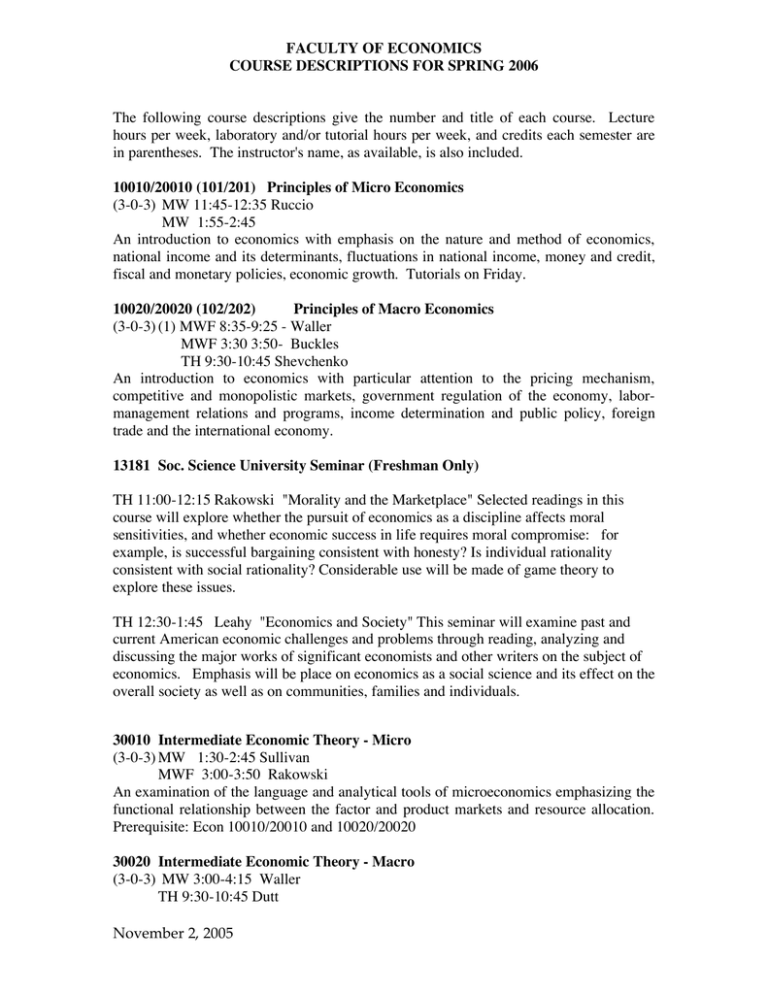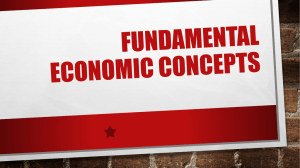The following course descriptions give ... hours per week, laboratory and/or tutorial hours per week, and... FACULTY OF ECONOMICS COURSE DESCRIPTIONS FOR SPRING 2006
advertisement

FACULTY OF ECONOMICS COURSE DESCRIPTIONS FOR SPRING 2006 The following course descriptions give the number and title of each course. Lecture hours per week, laboratory and/or tutorial hours per week, and credits each semester are in parentheses. The instructor's name, as available, is also included. 10010/20010 (101/201) Principles of Micro Economics (3-0-3) MW 11:45-12:35 Ruccio MW 1:55-2:45 An introduction to economics with emphasis on the nature and method of economics, national income and its determinants, fluctuations in national income, money and credit, fiscal and monetary policies, economic growth. Tutorials on Friday. 10020/20020 (102/202) Principles of Macro Economics (3-0-3) (1) MWF 8:35-9:25 - Waller MWF 3:30 3:50- Buckles TH 9:30-10:45 Shevchenko An introduction to economics with particular attention to the pricing mechanism, competitive and monopolistic markets, government regulation of the economy, labormanagement relations and programs, income determination and public policy, foreign trade and the international economy. 13181 Soc. Science University Seminar (Freshman Only) TH 11:00-12:15 Rakowski "Morality and the Marketplace" Selected readings in this course will explore whether the pursuit of economics as a discipline affects moral sensitivities, and whether economic success in life requires moral compromise: for example, is successful bargaining consistent with honesty? Is individual rationality consistent with social rationality? Considerable use will be made of game theory to explore these issues. TH 12:30-1:45 Leahy "Economics and Society" This seminar will examine past and current American economic challenges and problems through reading, analyzing and discussing the major works of significant economists and other writers on the subject of economics. Emphasis will be place on economics as a social science and its effect on the overall society as well as on communities, families and individuals. 30010 Intermediate Economic Theory - Micro (3-0-3) MW 1:30-2:45 Sullivan MWF 3:00-3:50 Rakowski An examination of the language and analytical tools of microeconomics emphasizing the functional relationship between the factor and product markets and resource allocation. Prerequisite: Econ 10010/20010 and 10020/20020 30020 Intermediate Economic Theory - Macro (3-0-3) MW 3:00-4:15 Waller TH 9:30-10:45 Dutt November 2, 2005 An intensive examination of macroeconomics with particular reference to the determination of national income, employment, and the general price level. Prerequisite: Econ 10010/20010 and 10020/20020 30330 Statistics for Economics - Introduction (3-0-3) TH 2:00-3:15- Lee TH 3:30-4:45-Mark This course seeks to introduce the student to the principles of probability and statistical theory appropriate for the study of economics. The emphasis of the course will be on hypothesis testing and regression analysis. 30130 Global Economic History (3-0-3) MW 3:00-4:15 Glave The course presents a comparative economic history emphasizing the sources of long term economic growth. The comparative analysis is used to explore different development strategies around the world over the past two centuries, from the British Industrial Revolution to the contemporary developing countries, focusing on examples from Europe, Latin America, and North America. Subjects include population change, migration, technological change, industrialization, market integration, education, inequality, and government expenditure. Each topic is discussed through a current economic policy concern. Special attention will be placed upon the role played by the natural resources endowments and institutional change. The last section of the course centers around the debates on globalization and inclusive development. Does going global foster growth? Who gains and who loses? 30400 Labor Economics (3-0-3) This course covers economic analyses of employment and unemployment, wages and inflation, unions, and industrial relations systems in this and other countries. 30500 The Economics of Poverty (3-0-3) MW 11:45-1:00 – Warlick An examination of the extent and causes of poverty in the United States. The current system of government programs to combat poverty is analyzed. Reforms of this system are also considered. Prerequisite: Econ 10010/20010 30800 Development Economics (3-0-3) MW 4:30-5:45 Ros The current problems of Third World countries are analyzed in a historical context, with attention given to competing theoretical explanations and policy prescriptions. The course will combine the study of the experiences of Latin American, African and Asian countries with the use of the analytical tools of economics. Prerequisite: Econ 10010/20010 30840 Eastern European Development (3-0-3) TH 2:00-3:15 Shevchenko This course provides an account of the policies adopted in the former socialist states of Eastern and Central Europe during their transition from planned to market economies. It seeks to identify the economic problems faces by socialist and post-socialist governments; to set out the theoretical analysis underlying the policies adopted to deal with them; to assess their impact on economic performance and the welfare of the population. November 2, 2005 33240 Political Economy of War and Peace – (writing intensive) (3-0-3) Thursday only -Dutt This course examines economic issues concerning war and peace, including new types of conflict such as civil wars and terrorism. By permission of instructor only. 33490 Migration, Education, and Assimilation: Three Forces that Built America (3-0-3) MW 1:30-2:45 Wozniak This course uses the tools of economics to understand driving trends and episodes of migration, education, and assimilation throughout America's history. Readings will apply economic concepts in various historical contexts, from the settling of the country by Europeans to the present day. Examples of course topics include: the major waves of European migration to the U.S., including waves of Irish immigration; the development and rise of the high school in America; important trends in educational attainment particularly of women and minorities; the economic effects of Civil Rights legislation; and the English language only debate. Economics knowledge at the level of Principles of Microeconomics would be helpful but is not required. A research paper is required. 33410 Labor Law (writing intensive) (3-0-3) TH 9:30-10:45-Leahy A study of the development of common and statutory law with reference to industrial relations in the United States with emphasis on the case method. 33260 Political Economy of Development (3-0-3) TH 3:30-4:45 Kim The course is divided into two parts. The first part provides an overview of the institutional and empirical features of the developing world, followed by a survey and critical evaluation of the conventional development theories. The second part looks into the selected topics evoking the critical, controversial stakes in Third World development debates today. The topics include; rent-seeking activities, land tenure and peasantry, micro-financing, corporate governance, failed state and market failure, market and democracy, income-distribution and poverty, feminism in development, ethnic conflicts in resource use, and population pressures. The approach taken in this course is a politicaleconomy perspective with references to the historical, cross-cultural, and empirical materials. The course aims at providing the students with intellectual spaces for alternative development paradigms and strategies. Where appropriate, the tools used in economic analysis will be reviewed at an elementary and accessible level. 33270 Economics of Science (3-0-3) MW 3:00-4:15 Mirowski This course describes the changing history of the organization and subsidy of scientific research, then surveys the different methods of economic theories and applied scientific process. 40050 Game Theory (3-0-3) TH 12:30-1:45 Gresik The objective of this course is to help students develop a good understanding of the basic concepts of game theory and learn how to employ these concepts to better understand November 2, 2005 strategic interactions. Topics covered will include normal form games, extensive form games, pure and mixed strategies, Nash Equilibrium, subgam3e perfect equilibrium, repeat games, and introduction to games of incomplete information. Selected applications will include competition and collusion in oligopoly, entry deterrence, political competition and rent seeking, social norms and strategic interaction. 40060 Advanced Microeconomics Theory (3-0-3) TH 3:30-4:45 – Rath This course will focus on some selective topics in modern micro economic theory. It may vary from term to term. A possible choice of a broad range of topics are: Choice under uncertainty, Game theory, Market mechanisms, Coalitional analysis, Public goods and Welfare economics. Each of these topics will be discussed with mathematical rigor. Some of the objectives of the course are to familiarize students with important analytical techniques of micro theory and their applications to the study of various economic phenomena and to help students to cultivate the ability to critically evaluate the usefulness and limitations of economic models.Prerequisite: Econ 30010 or permission of instructor. 40320(434) Applied Econometrics (3-0-3) TH 11:00-12:15 Lee This course introduces the statistical and econometric methods using the least squares estimation method in empirical economic applications. It is oriented toward the practical applications of economic theory with econometric methods rather than the theoretical development of these subjects. Emphasis will be placed on the analysis of economic problems such as the capital asset pricing model, wage discrimination, and the married women workforce participation decision issues. Prerequisite: Econ 30010 (301) or permission of instructor. 40550 Policy Budget Expenditure Policy (3-0-3) MW 4:30-5:45- Betson This course will introduce students to: normative and positive economic theories of the role of governmental agencies in the economy; privatization and the role of nonprofits; what level of government should undertake collective action? (Fiscal Federalism); examination of the level and composition of our federal and local governments' budget as well as the current budgeting process; cost-benefit analysis, theoretical and pragmatic practices; and the impact of governmental rules and regulations on the economy. Prereq: 30010 40710(472) International Trade (3-0-3)TR 12:30-1:45 Kim The objective of this course is to provide students with the basics of theory, institution, and practices of foreign trade and investment, with special references to economic integration at the regional and global level. By mastering the basic concepts and analytical skills, you will gain a better understanding of complex economic relations in today's global economy. The course at the same time emphasizes the application of basic theories and tools your have learned in analyzing contemporary policy issues. Prerequisite: Economics 30020 (302). November 2, 2005 43130(HPS 577) History of Economic Thought (3-0-3) MW 11:45-1:00 - Mirowski This course intends to ask how it is that we have arrived at this curious configuration of doctrines now called "economics"; and importantly, how differing modes of historical discourse tend to ratify us in our prejudices about our own possible involvement in this project. The course will begin in the 18th century with the rise of a self-conscious discipline, and take us through the stabilization of the modern orthodoxy in WWII. Effort will be made to discuss the shifting relationship of economics to the other sciences, natural and social. A basic knowledge of economics (including introductory economics and preferably intermediate economics) will be presumed. Prerequisite: Econ 10010/20010 ECON 43570 Economics and the Law (3-0-3) MW 1:30 - 2:45 Betson This course will introduce students to the economics analysis of our legal framework pertaining to property, contract and tort law. Additional topics will include an examination of the legal process and the relationship between crime and punishment. 43202 Problems in Politcal Economy (3-0-3) TR 11:00-12:15 Wolfson A seminar course on the political economy of globalization. Topics include neoliberalism, corporate strategies, capital mobility, outsourcing, free-trade agreements, international financial crises, the IMF, immigration, race and gender, plant closures, labor solidarity, and union strategies. The course will compare and contrast orthodox views of globalization with perspectives drawn from the writings of Marx, Keynes, Veblen, Polanyi, and other economists in the political economy tradition. Prerequisite: Econ 33200 November 2, 2005





